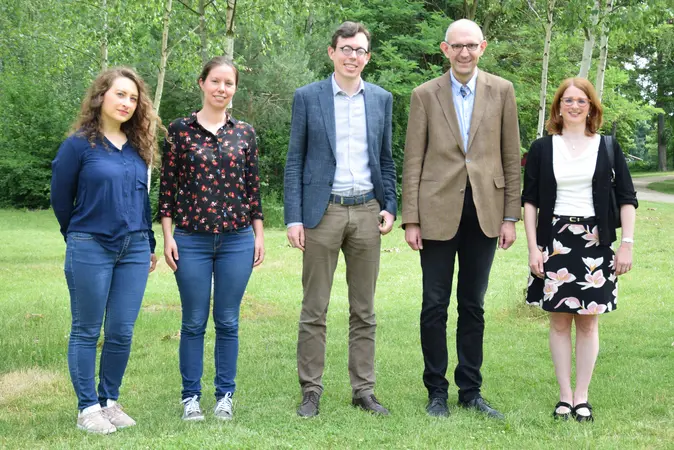Researching the concilar acts together (from left): Maria Constantinou, Luisa Andriollo, Peter Van Nuffelen, Peter Riedlberger and Lieve Van Hoof. Not pictured: Tommaso Mari.
Conciliar Acts: A Means of Communication in Roman Antiquity
Today, it is the media that publicise decisions taken by our parliaments. But what about in antiquity? Then, councils served a central function in ecclesiastical decision-making, and the communication of these decisions transpired by the use of conciliar acts. Some of these acts – comprised, to a large extent, of minutes – are extant today, and provide comprehensive evidence for researchers. “On many different levels, conciliar acts can be seen as a kind of treasure trove – but apart from theologians proper, little research had been carried out before our project started,” states Bamberg’s Dr. Dr. Dr. Peter Riedlberger. In 2015, he was awarded an ERC Starting Grant, the most coveted award for excellent young researchers. He used his nearly 1.5 million EUR to put together an international research team which continues to investigate the voluminous source material from a variety of different viewpoints. He and his team are now presenting some of their initial findings.
How decisions came into existence
Councils were assemblies of bishops that were supposed to settle theological and other ecclesiastical matters of dispute. These issues were of special importance during Late Antiquity, as in this period Christianity emerged as the dominant religion of the Roman Empire. “Back then, conciliar acts circulated in order to keep an interested public informed about how decisions came into existence,” explains history professor Van Nuffelen of Ghent University, who joined the research group in early 2019.
Conciliar acts notably comprise extensive minutes of the transactions. Riedlberger explains: “At that time, minutes played a crucial role. A bishop might cite directly from such minutes while preaching before his congregation.” The most important such acts available today are those from the Ecumenical Councils of Ephesus (AD 431), Chalcedon (AD 451) and Constantinople (AD 553) as well as from the synod of Jerusalem/Constantinople (AD 536). In the early 20th century, the great philologist Eduard Schwartz edited these texts in his monumental “Acta conciliorum oecumenicorum”; this edition is used by Riedlberger’s team.
Towards a new understanding of the acts
The Bamberg research team has already made some breakthrough findings. By carefully analysing the conciliar minutes (which involved employing statistical methodology), differences between the oral and written styles of individual personages could be determined. “Dr. Mari even succeeded in identifying specific individuals’ verbal tics,” says Riedlberger. Research by Dr. Constantinou clarified the provenance of archival material, which provided a novel vision into how conciliar acts were put together in the first place. Dr. Andriollo is exploring the fragmentarily documented history of minute taking in the Early Empire. Riedlberger says: “We’re on schedule. When this project is over, we’ll have paved the road for a completely new understanding of the intricate conciliar acts.”
Ancient discussions are what interests Van Nuffelen, too. As one of the world’s leading experts on ancient ecclesiastical historiography, he adds an additional viewpoint to the project. Another senior researcher to join the team is Professor Lieve Van Hoof, also from Ghent University; her stay is supported, inter alia, by an Alexander von Humboldt fellowship. Van Hoof, a historian with a specific interest in Libanios, is researching the correspondence before and after the councils, clarifying the role of ancient lobbying. The ERC research project is scheduled to conclude in 2021.
Further information on the ERC Starting Grant can be found here:
www.uni-bamberg.de/en/erc-stg-aco/theproject
Further information for media representatives:
Contact for content-related querries:
Dr. iur. Dr. phil. Dr. rer. nat. Peter Riedlberger
ERC Starting Grant
Tel.: +49 951/863-2053
peter.riedlberger(at)uni-bamberg.de
Media Contact:
Patricia Achter
Press Officer
Tel.: +49 951/863-1146
patricia.achter(at)uni-bamberg.de
